The case of Favelas
Favela is a term in Portuguese to refer to slums or shantytowns within or on the outskirts of cities. There are currently more than 6.000 Favelas in Brazil, located in more than 300 municipalities, representing more than 3.000.000 residences spread around the country.
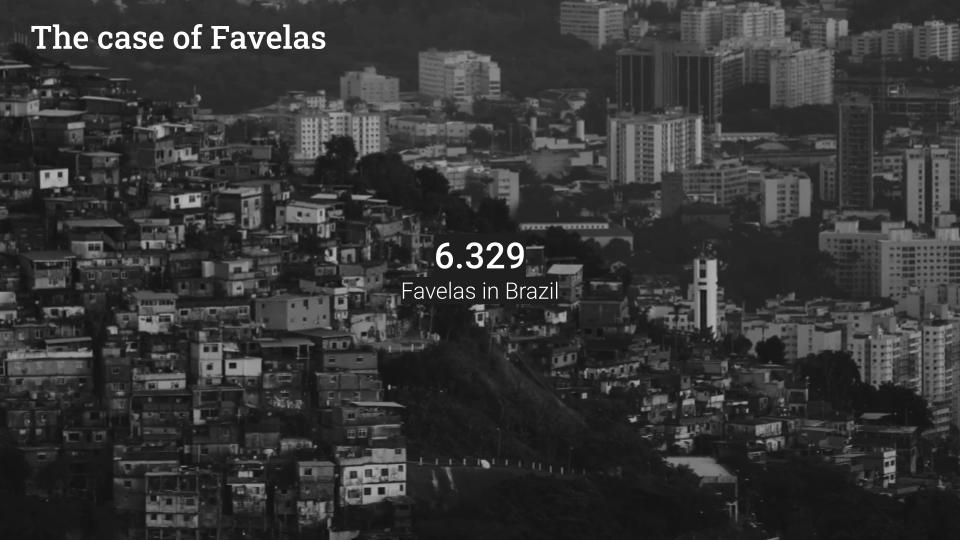
Favela residents face multiple challenges, starting with the fact that Favelas are constantly perceived as invisible cities: these territories are often unmapped, which causes the citizens to have no official address that they could list on job applications, no bank accounts, and miss on countless basic services, which reduces their economic opportunities, in addition to multiple other consequences. People living in Favelas also tend to have low education, and represent the higher dropout rates in the country. The reasons behind it include poverty, conflict and high population density. Not to mention discrimination due to misinformation of the population outside Favelas, which poses a challenge in their everyday life in general.
On the other hand, Brazil is facing a severe economic crisis, causing many companies to close to bankruptcy, and increasing unemployment to high levels in recent years. The contradiction, however, is between the current massive labor shortagesand the lack of job opportunity for young Brazilians in general. And behind all this, thegovernment means a challenge itself, as the ongoing multiple administration issues have led the country to the current economic situation, in addition to the fact that almost no investments are being made in education, for example. Nor in Favelas, who have experienced historical governmental neglect, especially after the recent Covid outbreak, which has led the administration of 10 big favelas in Brazil to get together and create G-10, an entity for crowdfunding campaigns and funding of basic services in their communities.
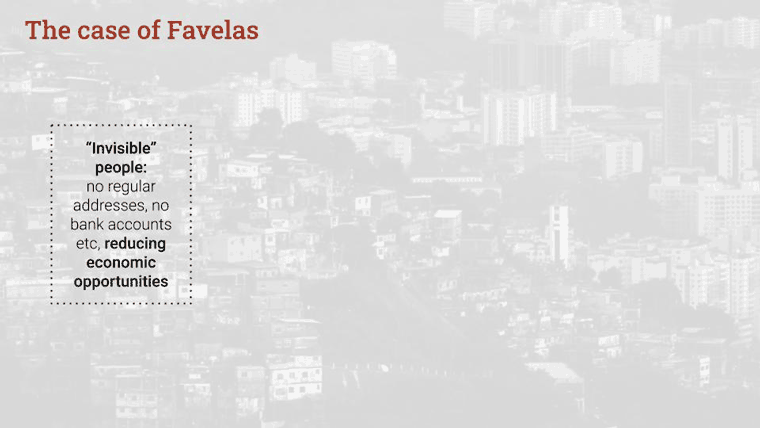
Why Blockchain as a solution?
Researchers have argued whether the informal sector is separate from the formal one, in a sense that existing policies are only addressing the issue from one side, the government one, without taking into account the community side. Moreover, this has caused Favelas to end up functioning in a bottom-only way: the official policy system is not embraced there, giving place to the establishment of local forms of regulation, and instead of responding to a city government, these residents have only their Favela administrators as the authority they acknowledge. This whole bottom-only system is aligned with Blockchain principals, and one confirmation is how the group G-10 has already started using Blockchain for their crowdfunding campaigns.
Furthermore, corruption and lack of transparency are major issues in Brazil, and 54% of Brazilians thought corruption even increased during the last year, as the government has not been clear about money spent in mitigating the Covid crisis. A transparent system like the one proposed would clarify the process and make sure the beneficiaries are indeed beneficiated. In addition to that, recent local education initiatives in Favelas have struggled with incentives and have been attempting to get companies involved to provide job opportunities, but the existing policies do not help in this matter.
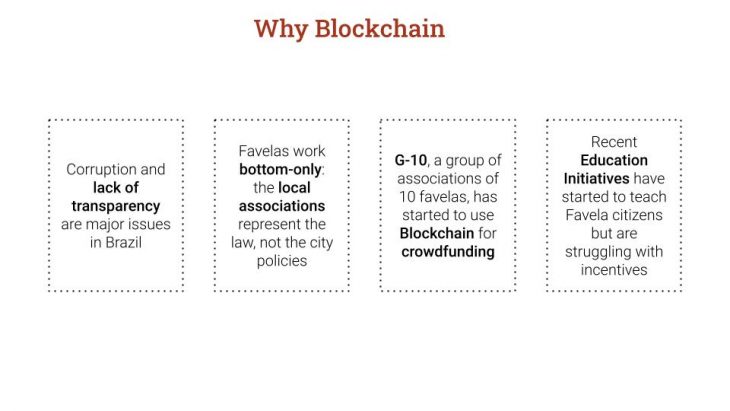
The Platform: educate and employ Favela residents
In order to achieve this goal, we divided the proposal in 2 phases. Phase 1 is the start of the project, organized by the Favela administrators, that invite electronic companies as a sponsor, and involve undergraduate students from Public Universities and Institutes as the ones to setup the platform and teach people how to register and use it, in exchange of supervised practice class hours they are already required. Favela residents would then be registered, receiving their initial tokens to begin their activity in the platform, earning more if they have a lower level of education and therefore would need more classes. Whereas private companies and the government would also be registered, for future benefits after phase 2.
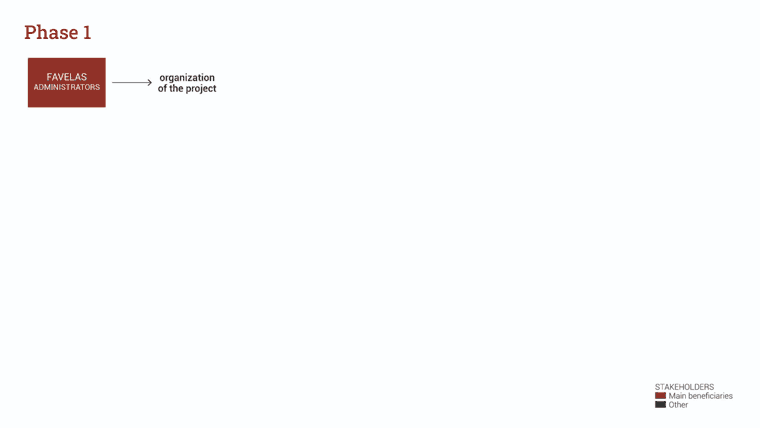
In Phase 2, after Favela residents have acquired their tokens, they can begin to “pay” for education. These utility tokens would be transferred to undergraduate students, and it would be of their own interest to teach more people or people with lower levels of education, as they would earn more tokens with that.
On the other side, their Public Universities and Institutes, would provide the classrooms available for these classes to occur, giving Favela residents the opportunity to take advantage of this existing public infrastructure that they don’t usually do, and allowing undergraduate students to fulfill supervised practice class hours, which are of the Universities interest, as they are mandatory.
After classes are completed, private companies involved would then hire groups of minimum 3 people and in exchange they would earn the students’ Educares as payment, which will then be translated in tax reduction. For doing so, the Favela Administrators, who are the DAO responsible for the project, would firstly issue a Certificate of Accomplishment for this company, and later on would have to approve the transaction between private entities and public administration.
In conclusion, the more people from the program this company hires, the more tax reduction it will receive, which will economically help them in a moment of crisis and lack of investments. The government, on the other hand, would benefit from the improvement of local economy and decrease of unemployment and corruption. The transaction between private companies and government needs to be approved by the BC DAO of Favela Administrators, reducing chances of corruption in the process. On the other hand, the rest of the platform would work with automated processes, and therefore wouldn’t need a Safe to function.
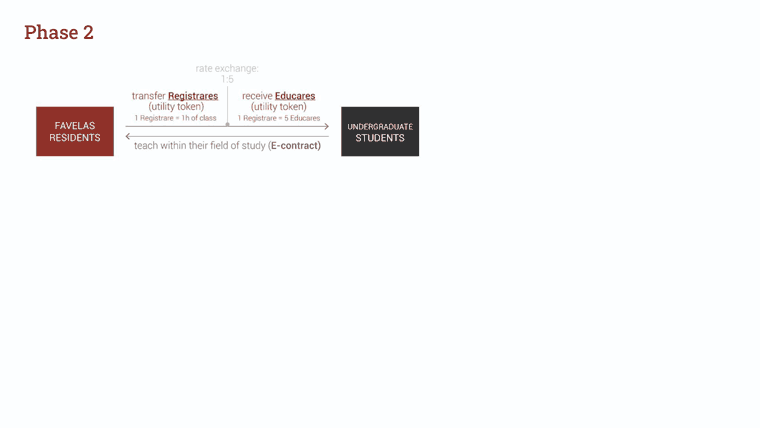
As a summary, the project can be described based on the four main characteristics of Blockchain: disintermediation, disruption, distribution and decentralization, through their physical codes, blockchain codes, cause stage and physical effect.
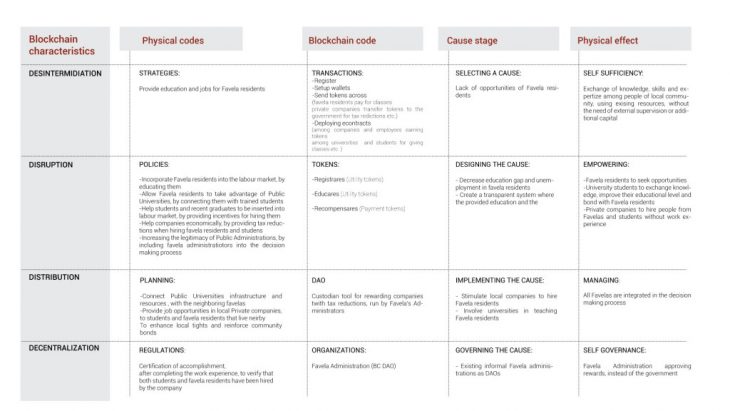
On a more technical description, the project can be summarized through its tokens for Designing the Cause, their equivalents for Implementing the Cause, and their Organizing Parameters which is the Blockchain Congress, or BC DAO, formed by the Favela Administrators. The process of creating this DAO and using it will also be shown in this report.
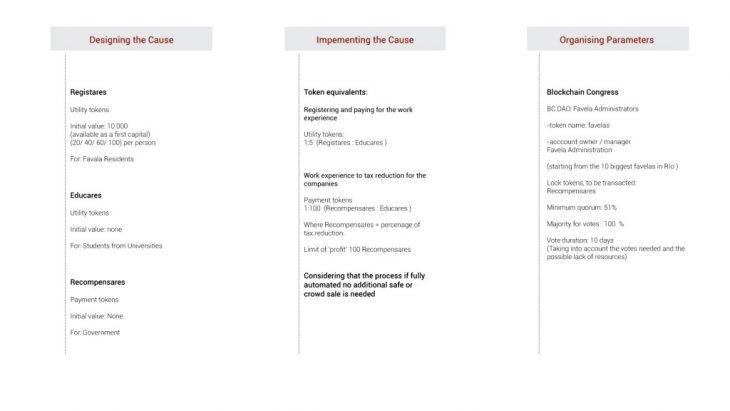
Blockchain for Invisible Cities is a project of IAAC, Institute for Advanced Architecture of Catalonia developed at Master in City & Technology in 2020/21 by students: Diana Roussi & Laura Guimarães and faculty: Maria-Luisa Marsal Llacuna